 It's been a while, hasn't it lovely reader? I didn't plan a month's hiatus but the stirrings of serious burnout addled by some backstage smackdown drama collided with a substantial set of other creative/writing obligations...and let's just say I've been distracted. And, whil I'm not sure that I'm "back," I do have some bits and bobs from 1983 to get off my plate. So without further ado: my favorite among the ladies considered in the 1983 Smackdown...
It's been a while, hasn't it lovely reader? I didn't plan a month's hiatus but the stirrings of serious burnout addled by some backstage smackdown drama collided with a substantial set of other creative/writing obligations...and let's just say I've been distracted. And, whil I'm not sure that I'm "back," I do have some bits and bobs from 1983 to get off my plate. So without further ado: my favorite among the ladies considered in the 1983 Smackdown...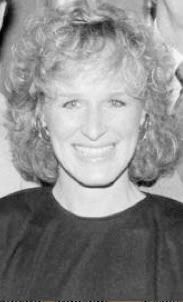
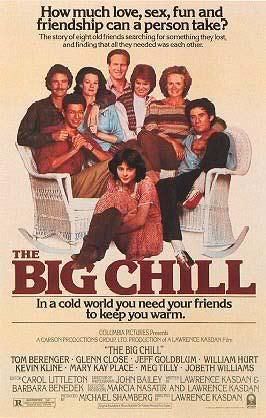
...Glenn Close in The Big Chill (1983)
approximately 21 minutes and 16 seconds
34 scenes
roughly 20% of film's total running time
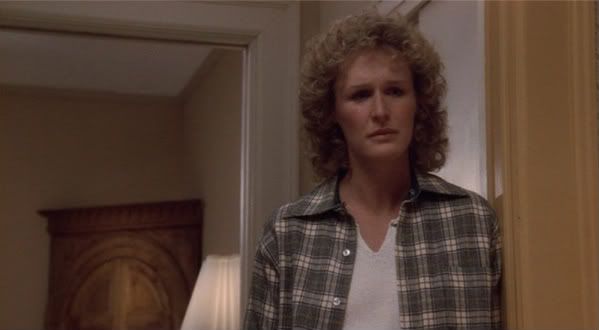 The film begins with an elegant array of mostly wordless reaction shots as a this varied group of friends (all white, all straight) receive the news and, then, wind their way to the funeral site somewhere near the South Carolina shore, where Sarah and her husband Harold (a charming and dapper Kevin Kline) have their summer home.
The film begins with an elegant array of mostly wordless reaction shots as a this varied group of friends (all white, all straight) receive the news and, then, wind their way to the funeral site somewhere near the South Carolina shore, where Sarah and her husband Harold (a charming and dapper Kevin Kline) have their summer home.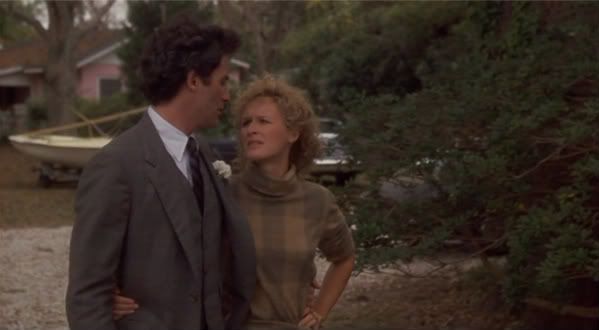 Throughout this sequence -- getting the news, getting to the funeral, getting through the funeral, getting away from the funeral -- Close's performance is constructed mostly through reaction shots.
Throughout this sequence -- getting the news, getting to the funeral, getting through the funeral, getting away from the funeral -- Close's performance is constructed mostly through reaction shots.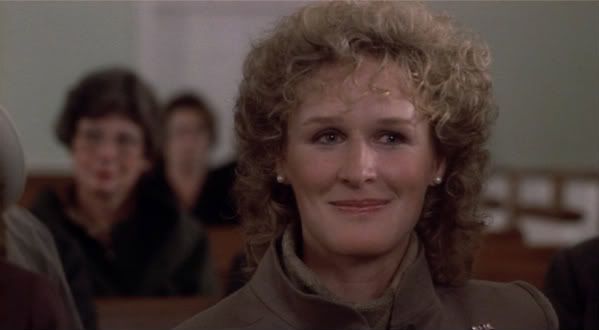 Close's Sarah is either smiling warmly (often as she guides this or that person to where they need to be) or as she is frozen (often with her mouth grimly set) in the terror of devastating grief.
Close's Sarah is either smiling warmly (often as she guides this or that person to where they need to be) or as she is frozen (often with her mouth grimly set) in the terror of devastating grief.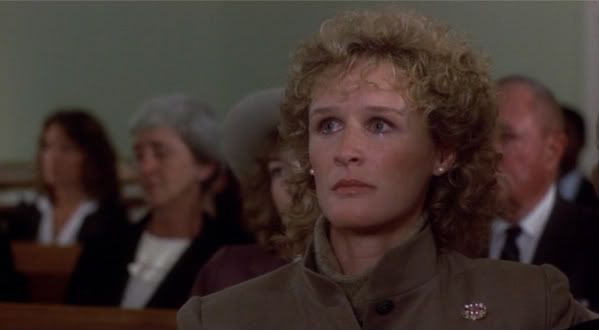 Throughout this opening sequence, Close suggests Sarah's apparently unnoticed fragility. Everyone's grieving. Everyone's devastated. But it's only Sarah who appears to be wavering between being completely in control and completely unhinged. This disparity in Close's performance as Sarah infuses a jolt of necessary urgency to the very polite funereal proceedings that act as prologue to this ensemble piece.
Throughout this opening sequence, Close suggests Sarah's apparently unnoticed fragility. Everyone's grieving. Everyone's devastated. But it's only Sarah who appears to be wavering between being completely in control and completely unhinged. This disparity in Close's performance as Sarah infuses a jolt of necessary urgency to the very polite funereal proceedings that act as prologue to this ensemble piece. This urgency is amplified when we (the audience) alone discover Sarah sobbing in the shower. Sarah's literally naked vulnerability in this sequence -- shocking almost in its intimacy -- provides our first real cue that this death will have real consequence for this assembled group of mourners. And in this scene, the film introduces Sarah as the audience's emotional lodestone for the remainder of the film, an emotional compass for most (if not all) that is to follow.
This urgency is amplified when we (the audience) alone discover Sarah sobbing in the shower. Sarah's literally naked vulnerability in this sequence -- shocking almost in its intimacy -- provides our first real cue that this death will have real consequence for this assembled group of mourners. And in this scene, the film introduces Sarah as the audience's emotional lodestone for the remainder of the film, an emotional compass for most (if not all) that is to follow.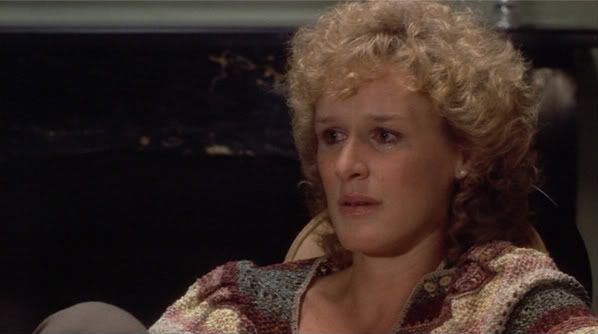 The film that follows is a fairly simple one. This group of friends (along with one outsider) must collectively reconcile how they feel about who "they" -- as individuals and en ensemble -- used to be with how they feel about who they are now, all while they're cooped up together on an impromptu retreat in the wetlands of South Carolina.
The film that follows is a fairly simple one. This group of friends (along with one outsider) must collectively reconcile how they feel about who "they" -- as individuals and en ensemble -- used to be with how they feel about who they are now, all while they're cooped up together on an impromptu retreat in the wetlands of South Carolina.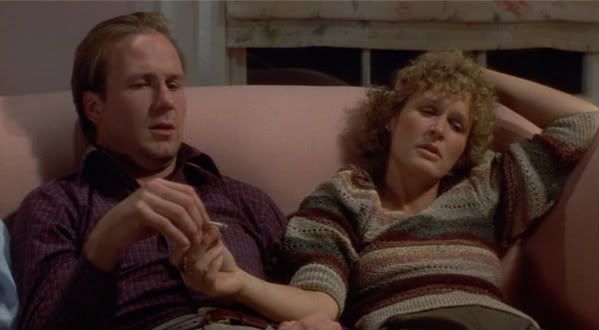 They eat. They talk. They flirt. They fight. They get high. They play tag football. They dance while washing dishes. They make life transforming decisions. A (mostly) good time is had by (mostly) all.
They eat. They talk. They flirt. They fight. They get high. They play tag football. They dance while washing dishes. They make life transforming decisions. A (mostly) good time is had by (mostly) all.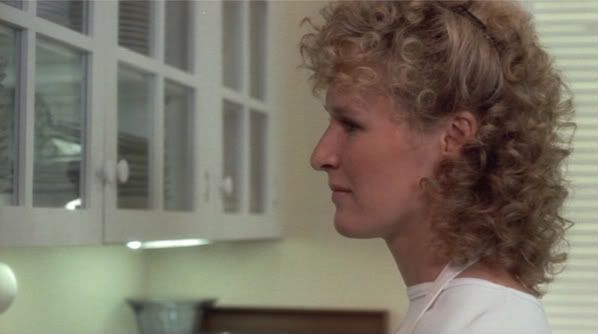 And, throughout, the still waters of Sarah's grief run deep. More than perhaps any of the others (with the possible exception of William Hurt's Nick and Meg Tilly's Chloe), Close's Sarah is devastated by Alex's death. Moreover, her feelings about Alex's death seem to separate Sarah from the rest of the group, rather than bringing her closer to them.
And, throughout, the still waters of Sarah's grief run deep. More than perhaps any of the others (with the possible exception of William Hurt's Nick and Meg Tilly's Chloe), Close's Sarah is devastated by Alex's death. Moreover, her feelings about Alex's death seem to separate Sarah from the rest of the group, rather than bringing her closer to them.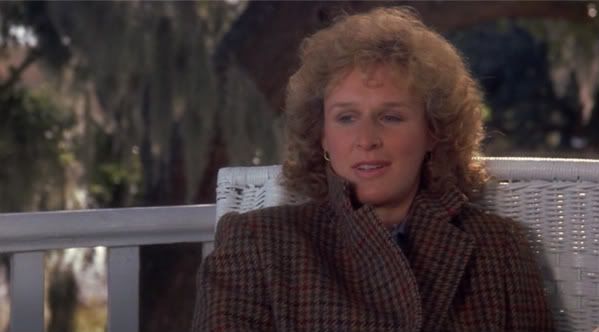 When Sarah shares her thoughts on romantic risk/fantasy as she and Karen are chatting on the porch, though, it becomes just a little bit clearer: Sarah loved Alex, possibly even to the extent of acting on those feelings, in ways that forever changed her.
When Sarah shares her thoughts on romantic risk/fantasy as she and Karen are chatting on the porch, though, it becomes just a little bit clearer: Sarah loved Alex, possibly even to the extent of acting on those feelings, in ways that forever changed her.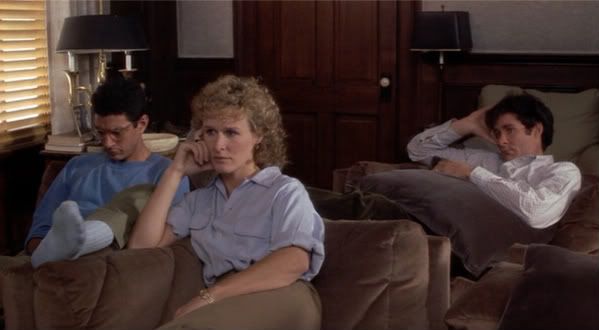 The character of Sarah is a complex one. Sarah's got a complicated internal struggle not necessarily conveyed in word or deed (except for snarky outbursts against her husband or Alex's girlfriend). Sarah also must make the narrative's most idiotic twist somehow plausible: Sarah must convincingly convince her husband Harold to shtup Meg, one of Sarah's dearest friends and godmother to Sarah and Harold's teen daughter.
The character of Sarah is a complex one. Sarah's got a complicated internal struggle not necessarily conveyed in word or deed (except for snarky outbursts against her husband or Alex's girlfriend). Sarah also must make the narrative's most idiotic twist somehow plausible: Sarah must convincingly convince her husband Harold to shtup Meg, one of Sarah's dearest friends and godmother to Sarah and Harold's teen daughter.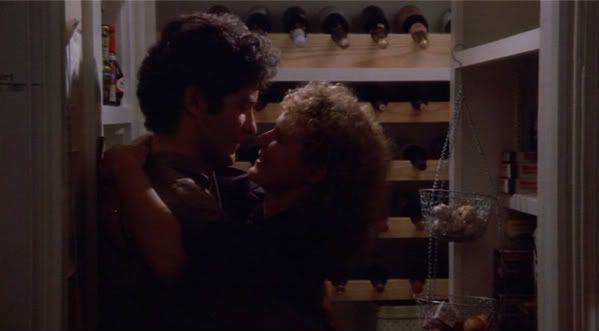 And, what's more, Sarah's got to be giddy happy about it.
And, what's more, Sarah's got to be giddy happy about it.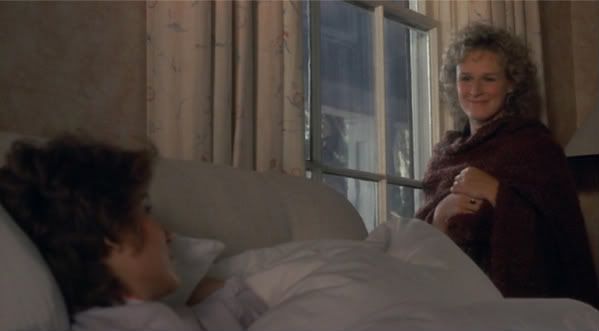 Yet, somehow, La Close makes this ridonkulous plot device somehow real. And this is where I come to truly admire the subtle, thoughtful and sophisticated work that Close does in crafting this character. In Close's characterization, Sarah's maneuvering of the "make a baby" connection between Meg and Harold seems to be something of an amends on Sarah's part. In "gifting" her husband's ween/sperm to her best friend, Sarah's letting go of something and it's exhilarating. I don't understand it but, because I've come to trust Sarah on an intuitive/emotional level throughout the narrative, I somehow go along with it. (Though it does amplify my convictions that the child we see Harold bathing in the opening shot...I think that's Alex's kid and that Sarah's the only one who knows, but that's a whole 'nother conversation.)
Yet, somehow, La Close makes this ridonkulous plot device somehow real. And this is where I come to truly admire the subtle, thoughtful and sophisticated work that Close does in crafting this character. In Close's characterization, Sarah's maneuvering of the "make a baby" connection between Meg and Harold seems to be something of an amends on Sarah's part. In "gifting" her husband's ween/sperm to her best friend, Sarah's letting go of something and it's exhilarating. I don't understand it but, because I've come to trust Sarah on an intuitive/emotional level throughout the narrative, I somehow go along with it. (Though it does amplify my convictions that the child we see Harold bathing in the opening shot...I think that's Alex's kid and that Sarah's the only one who knows, but that's a whole 'nother conversation.)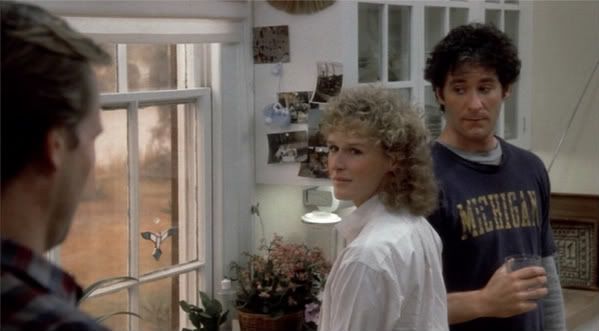 All in all, Close's characterization of Sarah is a smart, sophisticated bit of actressing. In the role of Sarah, Close does not correct her character's inconsistencies/incongruities but instead discerns and communicates the personhood mapped by them.
All in all, Close's characterization of Sarah is a smart, sophisticated bit of actressing. In the role of Sarah, Close does not correct her character's inconsistencies/incongruities but instead discerns and communicates the personhood mapped by them.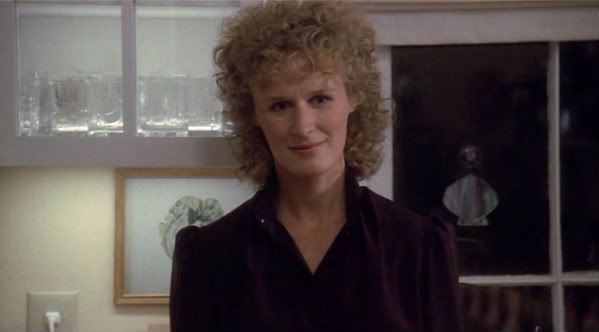 The Big Chill would simply not work without Close's clarifying, amplifying and humanizing performance at its center and this performance -- only her second screen role -- remains one of the actress's most startling accomplishments.
The Big Chill would simply not work without Close's clarifying, amplifying and humanizing performance at its center and this performance -- only her second screen role -- remains one of the actress's most startling accomplishments.

I love Glenn Close but this is one of those performances I just do not get all the hoopla about. The Big Chill is one of my mother's favorite movies and I watched it with her again a couple of months ago to see if I could glean anything new from it this time around (I didn't--they're still a bunch of whiny, middle-class losers). Close is the most interesting thing in this movie, but I just don't find the character or what she does to be as interesting as you seem to. It may be an over-simplification, but I find the whole performance to consist of Close looking at people with the same two expressions. I will agree that she does almost sell that ridiculous subplot at the end, but it's so stupid that I don't think any actor alive could completely get away with it.
ReplyDeleteI remember you liking her in Garp and didn't you want her to win that year? That means consecutive love for Glenn. Do you generally adore her as an actress or are you taken by surprise, performance by performance?
ReplyDeleteI'm not much of a Close fan, really, but do I think I really enjoy these first two performances/nominations so much because you can see the clarity of her work. She's learning the medium and there's an energy within the performance that I find fascinating. By the time we get to The Natural, we begin to see the Close-isms ossify and I start becoming less interested.
ReplyDeleteStinky,
ReplyDeleteGlad to see you writing again.
Thanks for the Glenn Close write-up. I agree that her final husband-swap resolution about the baby is ludicrous. My guess is that she's doing it partially out of a sense of guilt for having had the affair with Alex (though Close doesn't play it that way). Since she's cheated on Harold, she gives Harold permission to cheat on her and to make her friend Meg fulfilled in the process.
Great to see you're back, even if you're not back. I really love this performance. And yes Close does sell that ridiculous baby making part of the plot.
ReplyDeleteI've always loved The Big Chill--especially Glenn Close's performance. And I would not call the characters "whiny, middle-class losers"--almost all of them are quite successful in life--and when old friends get together after many years, they catch up and talk and talk some more. I don't consider that "whining". However, I do think Close's Garp role was more Oscar-worthy just because it seemed more of a stretch for her as an actress.
ReplyDeleteI sometimes think Glenn's most Oscar-worthy supporting actress performance was her non-nominated turn in the otherwise execrable STEPFORD WIVES (2004). She's buh-rilliant in that.
ReplyDeleteGlenn can be very hit or miss for me -- but I recently have loved her in Heights, which I thought was a delicious, scenery-chewing role for her.
ReplyDeleteThis write-up makes me want to go back and take a closer look at this one...
I've always found her to be incredible overrated in The Natural and Garp.
are we getting Amy Irving anytime soon? :D
ReplyDelete